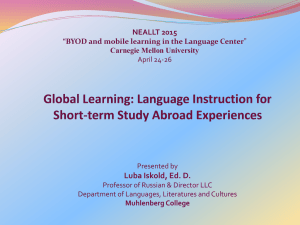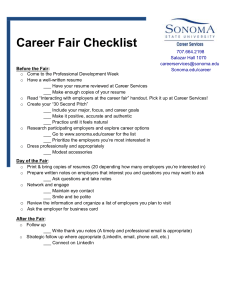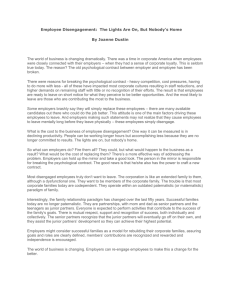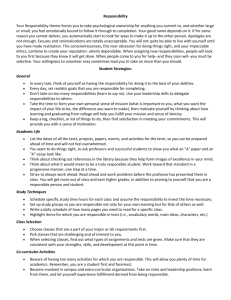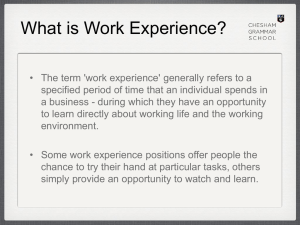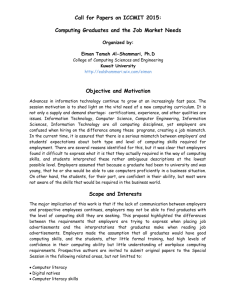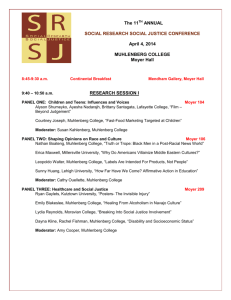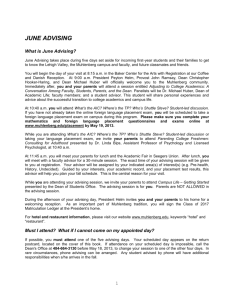Speech to the Foreign Language Honor Society Induction 2005
advertisement
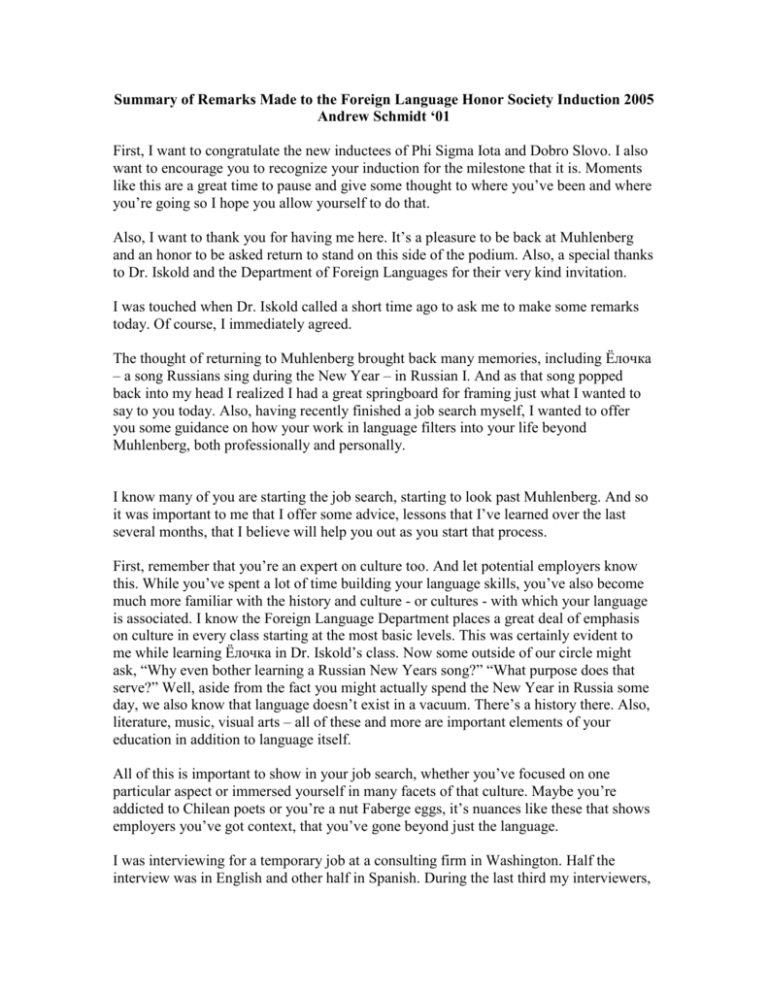
Summary of Remarks Made to the Foreign Language Honor Society Induction 2005 Andrew Schmidt ‘01 First, I want to congratulate the new inductees of Phi Sigma Iota and Dobro Slovo. I also want to encourage you to recognize your induction for the milestone that it is. Moments like this are a great time to pause and give some thought to where you’ve been and where you’re going so I hope you allow yourself to do that. Also, I want to thank you for having me here. It’s a pleasure to be back at Muhlenberg and an honor to be asked return to stand on this side of the podium. Also, a special thanks to Dr. Iskold and the Department of Foreign Languages for their very kind invitation. I was touched when Dr. Iskold called a short time ago to ask me to make some remarks today. Of course, I immediately agreed. The thought of returning to Muhlenberg brought back many memories, including Ёлочка – a song Russians sing during the New Year – in Russian I. And as that song popped back into my head I realized I had a great springboard for framing just what I wanted to say to you today. Also, having recently finished a job search myself, I wanted to offer you some guidance on how your work in language filters into your life beyond Muhlenberg, both professionally and personally. I know many of you are starting the job search, starting to look past Muhlenberg. And so it was important to me that I offer some advice, lessons that I’ve learned over the last several months, that I believe will help you out as you start that process. First, remember that you’re an expert on culture too. And let potential employers know this. While you’ve spent a lot of time building your language skills, you’ve also become much more familiar with the history and culture - or cultures - with which your language is associated. I know the Foreign Language Department places a great deal of emphasis on culture in every class starting at the most basic levels. This was certainly evident to me while learning Ёлочка in Dr. Iskold’s class. Now some outside of our circle might ask, “Why even bother learning a Russian New Years song?” “What purpose does that serve?” Well, aside from the fact you might actually spend the New Year in Russia some day, we also know that language doesn’t exist in a vacuum. There’s a history there. Also, literature, music, visual arts – all of these and more are important elements of your education in addition to language itself. All of this is important to show in your job search, whether you’ve focused on one particular aspect or immersed yourself in many facets of that culture. Maybe you’re addicted to Chilean poets or you’re a nut Faberge eggs, it’s nuances like these that shows employers you’ve got context, that you’ve gone beyond just the language. I was interviewing for a temporary job at a consulting firm in Washington. Half the interview was in English and other half in Spanish. During the last third my interviewers, who were Venezuelan, focused on the fact that I took salsa lessons during my time at Middlebury College. So we talked about salsa for about fifteen minutes. They saw in that interview that I had gone further than just studying the language. I showed I was aware of the broader world in which that language exists. Twenty four hours later they called and offered me the job. And I took it. Keep this in mind. Remember that your education involves not just the language but culture as well. Realize that culture is also a very important dimension of your career and helps to demonstrate to employers that you’ve got context. This is a great advantage in studying a language and make sure you use it. Second, learn a language within your language. Presumably, you’re eyeing a specific field – maybe environmental policy, health care, or economics. As part of your job search, begin to learn how ideas and issues that specific field are discussed in the foreign language you’re studying. There’s certainly a lot of competition out there and you better your chances of getting a great job if you can fill a linguistic niche that other students can’t. If you look at your target job and figure out how native speakers speak and think about a particular discipline, you’ll be better able to fill that niche. I was interviewing at the Inter-American Development Bank several months ago. The job involved, among other things, being able to discuss economics in Spanish. To prepare myself, I made up a list – a pitifully short vocabulary list – of economics terms. Well, once I got into the interview I realized this wasn’t at all adequate. While I had some words in mind, I didn’t have any experience putting those words to use in actual sentences and complete thoughts. It simply wasn’t enough. I needed to go further and learn how to talk about economics in Spanish. Again, there’s a lot of competition but if you do more than I did – that is, develop an ability to speak about your career field in your language – you increase your chances of making more progress in the application process. You’ll be more valuable to employers and show yourself to be a very sophisticated speaker in that field. Third, make your language skills as evident as possible as early as possible. As I mentioned before, you’ve got a lot of competition to contend with and need to distinguish yourself from the outset. Some of the best interviews I had were conducted in Spanish and so my specific advice to you is this: Ask to be interviewed in your foreign language. There are two reason to make this offer. One is that there’s value in the offer itself. You prove to employers you’re willing to be measured by a higher standard than others who don’t – or can’t – make that offer. It lets employers know you’re serious about your language skills and willing to put them to the test. Second, you give yourself the chance to show employers just how much you’ve learned. You already have the excellent education and experience to back up this kind of offer. Making the offer allows you to prove it. Granted, the best advice in the world doesn’t guarantee you a job. Following steps like these, however, does guarantee that you can put yourself in that top sliver of applicants who make the final interviews and ultimately get the job. That’s what you should be shooting for. That’s where you belong. So be sure to take the steps necessary for getting yourself there. Now, you don’t just learn a language to get a job. Starting Russian with Dr. Iskold led me back to Spanish. These two languages, in turn, led me to study international affairs, politics, and history. My work in these languages has certainly proved to be a great departure point for projects in other disciplines. From my final year at Muhlenberg to my two years in grad school, when I needed an idea for a research paper or presentation, I found I could always return to the language for a starting point: moving from the Russian language to writing about democracy in Russia… or the state of media in Russia. These are topics suggestive of those that pop up in language classes, especially at Muhlenberg. In this way, language is an intellectual departure point for many other disciplines and I want to encourage you to see your work in this way – as a doorway to new ideas and discovery. Preparing for today I was doing laps around my apartment and I realized there’s not a corner in my apartment that hasn’t been touched in some way by my interest in foreign languages - from the music on the piano, to the tapas recipes in the kitchen, to the history books, novels, and poetry on my bookshelf. I want to encourage you to extend your language studies beyond the classroom and beyond your career. As I’m sure you’ve heard many time before, the purpose of a liberal arts education is not just to educate you to have a job but to educate for life, to educate you to have a life. That’s certainly the direction I’ve found myself going when it comes in an interest in foreign languages. Of course, the things in my apartment aren’t important because they fill space but because they represent something: a continuing interest in the associated language and culture as well as an opportunity to continue learning and exploring new avenues of each. As you surround yourself with those elements of language and culture that strike you, you begin to internalize them, to make them your own. And you really begin to appreciate these things as you leave the interdisciplinary feel of Muhlenberg for a world that is generally more specialized. Language is a great way to keep life threedimensional. I want to say two more things before finishing. First: don’t stop learning languages. In addition to the language itself, you’ve learned how to learn a language. This makes it all the more easier for you pick up a second or third foreign language and I want to encourage you to pursue that. Second, and I promised myself that if I ever returned to Muhlenberg to speak to students I would say this and now I have my chance: take advantage of your professors’ expertise. Never again will you be surrounded by so many intelligent people who are so willing to help you out. Even in graduate school you tend not to see the accessibility you have here. Your professors can help you pinpoint opportunities and I encourage you to welcome their guidance. Having said that, I want to thank you for your time. Thank you for having me here and best of luck to you in the future.

